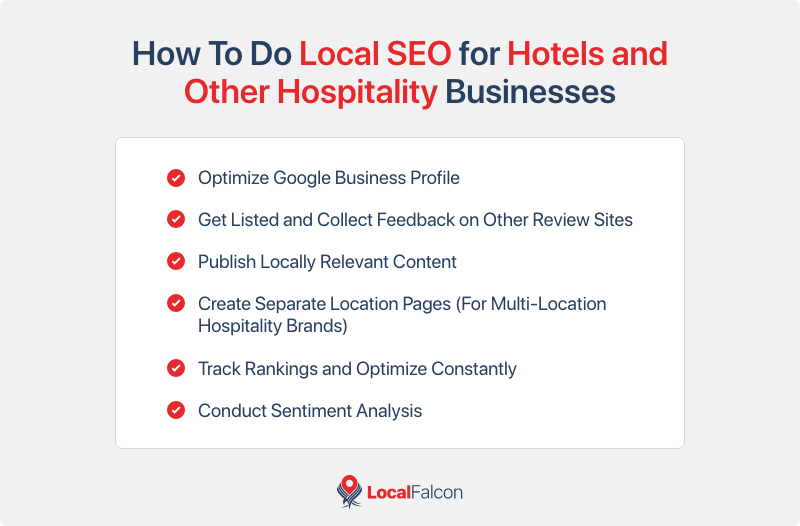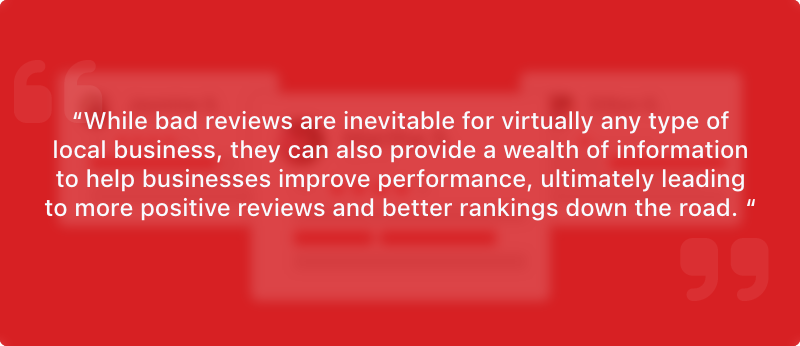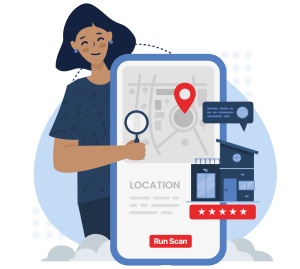When someone is planning a vacation, a work trip, or any other type of travel, Google is usually the first place they turn to find and book accommodation, making the hospitality industry one of the most competitive in local search.
But how do hotels and other hospitality businesses ensure visibility in local search results, ultimately driving more bookings? The answer is simple: local SEO.
Doing local SEO for hotels helps them appear at the top of search results when someone searches for something like "best hotels in Old Port Montreal" or "budget hotel near Chicago airport."
Not only does appearing in local search results help potential guests find a hotel, it also builds trust, increasing the chances of them choosing the hotel over its competitors. In other words, doing local SEO for hospitality brands should be a top priority for their marketing teams!

How To Do Local SEO for Hotels and Other Hospitality Businesses
1. Optimize Google Business Profile
As with any type of local business, the first thing you should do when implementing local SEO for a hotel or any other hospitality business is to optimize your Google Business Profile listing.
This involves filling out all business information fields that impact your rankings completely and accurately, as well as selecting the most relevant primary and secondary categories. For example, a hotel located in or near an airport should set "Airport Hotel" as its primary category, while a small, chic hotel catering to tourists should choose "Boutique Hotel."
Since hotel guests rely heavily on visual content and reviews to help them choose where to stay, it's also incredibly important to optimize your GBP with high-quality images and videos and lots of fresh positive reviews.
So, make sure to follow up with guests after their stay and ask for reviews and regularly add new visual content to your GBP listing to keep it fresh and engaging to boost rankings and drive bookings.
2. Get Listed and Collect Feedback on Other Review Sites
Speaking of reviews, Google isn't the only place hospitality brands should collect reviews to improve their local SEO. Hotel review sites like Tripadvisor, Yelp, and other more industry-specific platforms also play an important role.
Listings and reviews on these sites help build reputation and boost rankings, and can appear in the organic search results below Google's local pack results.
Additionally, other search engines, such as Bing, pull business information and reviews directly from sites like Tripadvisor, making it important for hospitality brands to collect reviews on different platforms to maximize visibility and market share.
3. Publish Locally Relevant Content
Crafting locally relevant content is one of the best ways to drive more organic traffic to a hotel's website and build authority with search engines.
For instance, hotels located in popular tourist destinations might publish blog posts with topics like "Top 10 Restaurants in Montreal's Little Italy" or "Best Museums in San Francisco."
That way, when someone's doing research to plan a trip to that destination, they'll come across the hotel's website and be more likely to consider booking a stay there during their travels.
Doing local keyword research can help you build a list of the most valuable keywords to create content around for hotel local SEO.
4. Create Separate Location Pages (For Multi-Location Hospitality Brands)
Hotel chains and other hospitality brands with multiple locations should be sure to create separate landing pages on their website for each location. This allows you to target hyperlocal keywords on each page to drive more traffic for searches with local intent.
Make sure each location's landing page contains unique content and incorporates relevant geo-modified keywords naturally throughout the content, including in headings. Each page should also have specific contact information for that location, matching the info on Google Business Profile and other listings.
Another reason to create location-specific landing pages when doing local SEO for hospitality brands is that you can link to each location's page from its unique Google Business Profile, providing users with the most relevant information and improving URL relevance in the eyes of Google, as website URL is an important local ranking factor.
5. Track Rankings and Optimize Constantly
Doing local SEO for hotels is not a one-time task. It requires constant monitoring and optimization to drive continued success.
Use a local rank tracker, such as Local Falcon, to check your rankings for target categories and keywords in local search results every couple of weeks and identify opportunities for improvement.
If you use Local Falcon, the built-in Falcon AI can even provide you with actionable recommendations for optimizing Google Business Profile and improving your overall local SEO strategy to outrank competitors at specific points on the map.
Additionally, Local Falcon provides insights into your AI visibility, or where and how your business is appearing in AI-generated search results, such as Google AI Overviews. While not as much of a traffic source as traditional local search results, tracking your visibility in AI-generated results can provide you with a more comprehensive picture of your hospitality brand's overall local SEO performance.
6. Conduct Sentiment Analysis
Customer sentiment is huge in local SEO, especially for hospitality brands, as reviews directly impact both rankings and customer purchase decisions.
While bad reviews are inevitable for virtually any type of local business, they can also provide a wealth of information to help businesses improve performance, ultimately leading to more positive reviews and better rankings down the road. Plus, dealing with a negative review in the right way can even turn a disgruntled customer's bad review into a good one!

But despite its potential to be a gold mine of information, many hospitality businesses overlook sentiment analysis.
If you want to minimize the negative impact of bad reviews and turn sentiment around before it can hurt your rankings, Local Falcon's AI-powered Reviews Analysis Reports can provide the in-depth insights you need.
By analyzing up to thousands of Google reviews at once, the Reviews Analysis tool allows hotels to quickly identify trends in feedback, identify problem areas to address, and find out what customers love.
Reviews Analysis Reports even analyze your top competitors' reviews, helping you identify what's working for them, so you can try to replicate it, or understand what customers don't like about them, so you can differentiate your business from theirs.
Wrapping Up
Hotel local SEO is essential for staying competitive in a crowded market and attracting more guests.
With the right approach that combines the tactics we discussed above, hotels and other hospitality businesses can improve visibility, build trust with potential guests, and maximize revenue through effective local search optimization!


